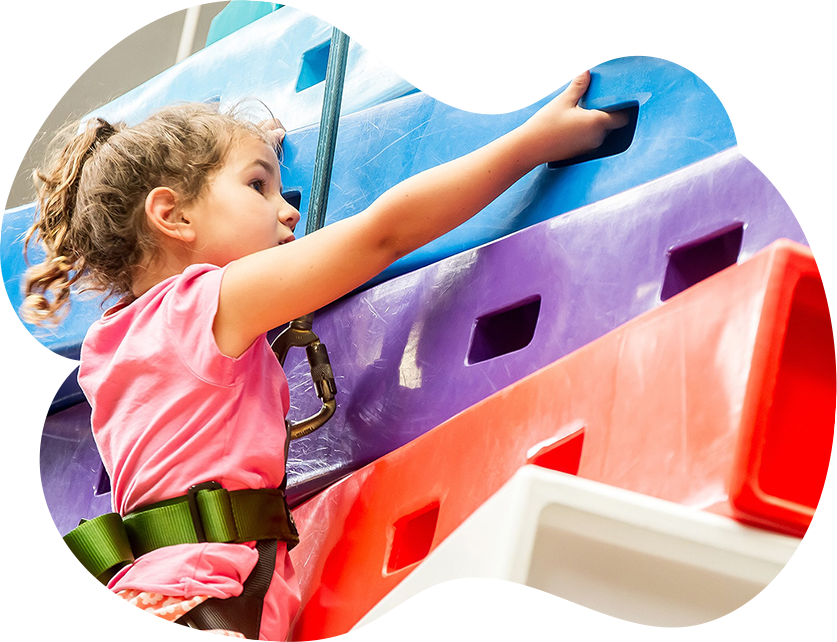Sensory IntegrationA child with sensory processing deficits may have difficulties in the following areas:
Tactile Processing (Touch): Avoids touching or being touched; reacts strongly to a light touch; dislikes getting dirty; objects to clothing textures and tags or craves touching and being touched; unaware of temperature or pain; bumps into objects and people.
Visual Processing (Sight): Poor eye contact; covers eyes; over-reactive to bright lights; over excited by too much to look at or touches everything because vision is poorly coordinated; misinterprets facial expressions, gestures, written directions and signs.
Auditory Processing (Sound): Covers ears to shut out voices or sounds; complains about loud noises such as vacuums, hair dryers, fans, and the flushing of a toilet or seems to ignore voice; has difficulty following verbal directions; speaks in a loud voice or has speech delays.
Olfactory (Smell): Objects to odors that others don’t notice; will not eat foods with strong smells or does not notice unpleasant odors; sniffs people, objects and food.
Gustatory (Taste): Will not eat foods with certain textures or temperatures; has limited diet; gags when eating or eats or licks inedible objects; prefers very hot or spicy foods.
Vestibular (Movement and Balance): Avoids running, sliding, climbing or swinging; insecure when off balance or craves swinging, rocking, twirling; does not get dizzy; in constant motion and fidgety.
Proprioceptive (Body Awareness): Uncoordinated; stiff; avoids playground activities requiring coordination; appears clumsy; slouches; bumps into things; stomps feet and twiddle fingers.
Praxis (Motor Planning): Seem clumsy, accident prone, experience prolonged difficulty in master of new skills, attempt to imitate actions of peers rather than try to initiate activity independently, have difficulty developing a strategy to complete new tasks and therefore work slowly, work is messy and haphazard.
Behavioral: Impulsive; lack of self control; easily distracted; short attention span; resistance to new situations; difficulty with transitions; angry; frustrated; gives up easily; intensely shy and withdrawn; difficulty making friends; overly sensitive; unable to calm down.
SI Defined:
Occupational therapist, Dr. A. Jean Ayres, defined sensory integration in 1979 as a neurological process that is “the organization of sensation for use”. Sensory input provides us information about the environment in which we live and helps us to understand the world and how to interact within it. Children who are unable to effectively integrate sensory input may have sensory processing deficits otherwise known as Dysfunction of Sensory Integration (DSI).
The occupational therapists at P.A.T. are highly trained in Sensory Integration Theory and can assist a child with sensory processing deficits and his/her family by recognizing areas of difficulties and setting up goals to improve the child’s functional performance. Our occupational therapists use a variety of therapeutic activities and purposeful play to develop the necessary skills needed for the child to participate fully in school, home or community activities. Our unique sensory gym environemnt is ideally suited to achieving the best outcomes for your child.
SI Defined:
Occupational therapist, Dr. A. Jean Ayres, defined sensory integration in 1979 as a neurological process that is “the organization of sensation for use”. Sensory input provides us information about the environment in which we live and helps us to understand the world and how to interact within it. Children who are unable to effectively integrate sensory input may have sensory processing deficits otherwise known as Dysfunction of Sensory Integration (DSI).
The occupational therapists at P.A.T. are highly trained in Sensory Integration Theory and can assist a child with sensory processing deficits and his/her family by recognizing areas of difficulties and setting up goals to improve the child’s functional performance. Our occupational therapists use a variety of therapeutic activities and purposeful play to develop the necessary skills needed for the child to participate fully in school, home or community activities. Our unique sensory gym environemnt is ideally suited to achieving the best outcomes for your child.

